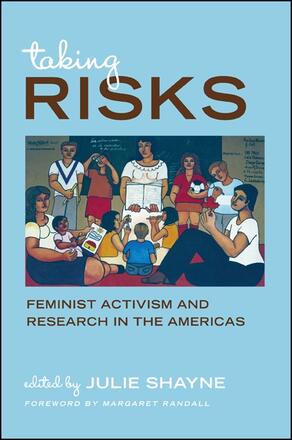
Taking Risks
Feminist Activism and Research in the Americas
Alternative formats available from:
Explores activist scholarship in relation to feminism and social movements in the Americas.
Description
Taking Risks offers a creative, interdisciplinary approach to narrating the stories of activist scholarship by women. The essays are based on the textual analysis of interviews, oral histories, ethnography, video storytelling, and theater. The contributors come from many disciplinary backgrounds, including theater, history, literature, sociology, feminist studies, and cultural studies. The topics range from the underground library movement in Cuba, femicide in Juárez, community radio in Venezuela, video archives in Colombia, exiled feminists in Canada, memory activism in Argentina, sex worker activists in Brazil, rural feminists in Nicaragua, to domestic violence organizations for Latina immigrants in Texas. Each essay addresses two themes: telling stories and taking risks. The authors understand women activists across the Americas as storytellers who, along with the authors themselves, work to fill the Latin American and Caribbean studies archives with histories of resistance. In addition to sharing the activists' stories, the contributors weave in discussions of scholarly risk taking to speak to the challenges and importance of elevating the storytellers and their histories.
Julie Shayne is Principal Lecturer in Interdisciplinary Arts and Sciences at the University of Washington Bothell and Affiliate Associate Professor of Gender, Women, & Sexuality Studies and Latin American and Caribbean Studies at the University of Washington Seattle. She is the author of They Used to Call Us Witches: Chilean Exiles, Culture, and Feminism and The Revolution Question: Feminisms in El Salvador, Chile, and Cuba.
Reviews
"…a powerfully written volume … Not only does the volume include a variety of interdisciplinary, transdisciplinary, and activist-scholar perspectives, it also represents a variety of work that takes place across the Americas with diasporic peoples and exiled communities, as well as in transnational and borderland areas. " — Journal of the Royal Anthropological Institute
"…it is an important book to read, because it is simultaneously unsettling with the painful and mostly invisible realities it presents, profound with the clarity of its observations, and inspiring with the hopefulness of the struggles and perseverance it documents. " — Mobilization
"The strength of this volume lies in the intersection of fascinating case studies on contemporary feminist activism in the Americas with ample conversation about feminist methodological practices … highly useful for graduate students, junior and more senior scholars who want to ensure that their research is accountable to and useful for the communities that they study. " — The Latin Americanist
"Shayne's edited volume sheds light on the real everyday and institutional challenges to doing feminist and activist research in the Americas … Highly recommended. " — CHOICE
"Editor Julie Shayne makes a strong case that reflections of feminist risk-taking of varying kinds and degrees help us recognize both the challenges and benefits that can result. For this reason, the reflexive volume will be helpful to scholars engaging in feminist research in Latin America and other Southern/non-Western contexts. " — Gender & Society
"Julie Shayne took a risk with this book, and the result is impressive: By challenging the activism-research divide that US academies so often sustain, the authors in this collection challenge epistemological as well as national, race, class, age, and gender boundaries. Taking Risks is a must read for researchers and students alike!" — Amy Lind, editor of Development, Sexual Rights, and Global Governance